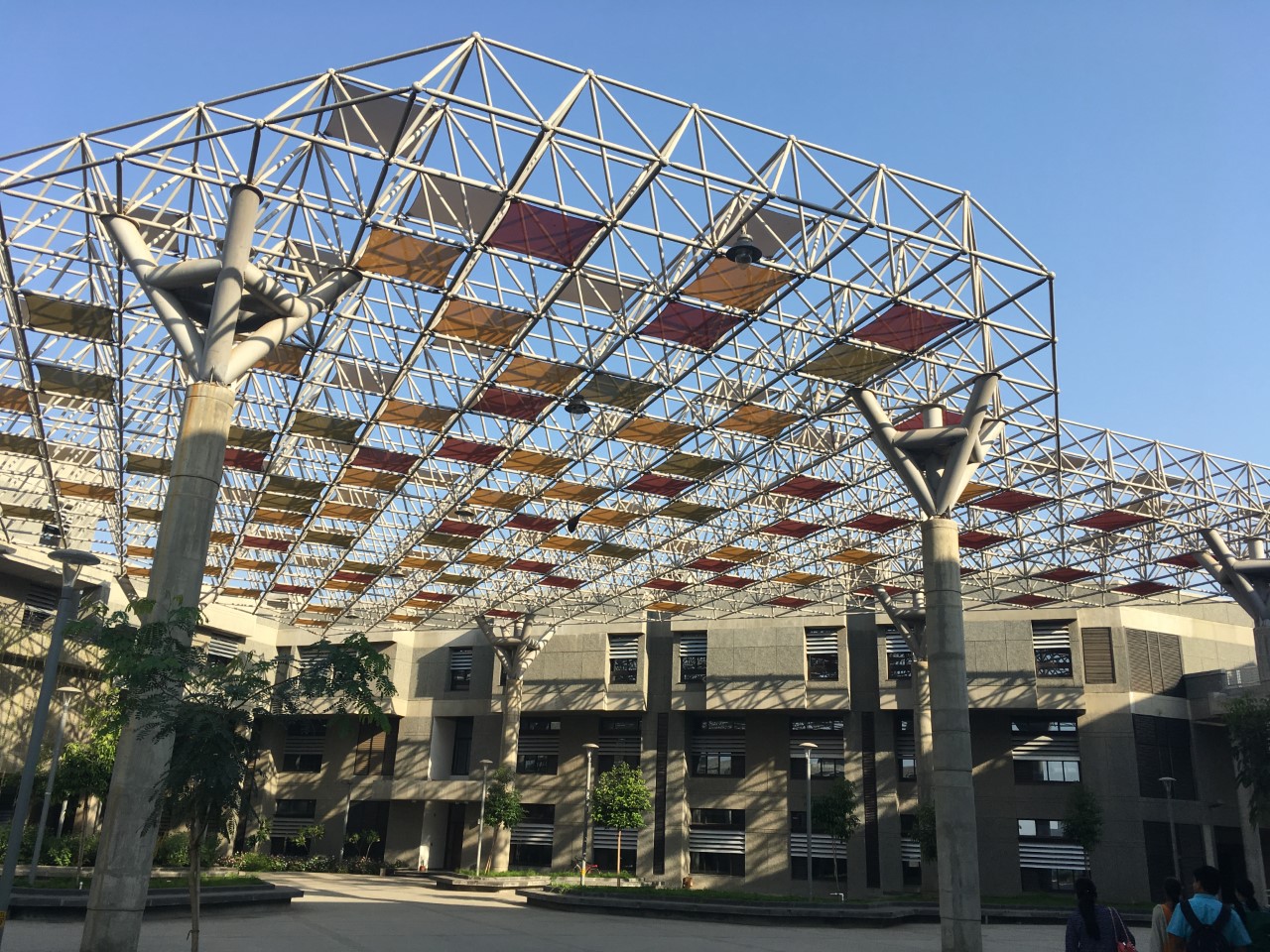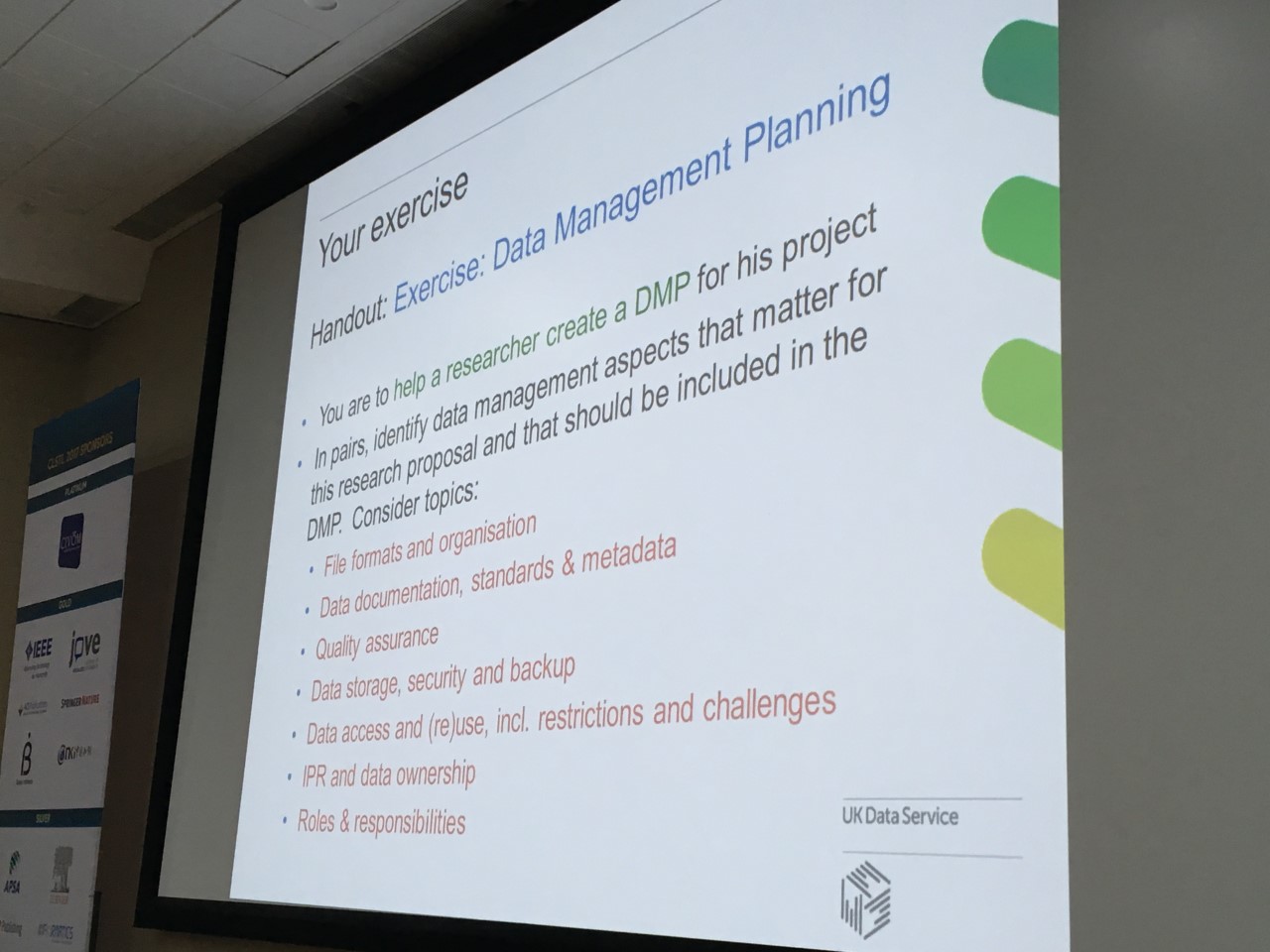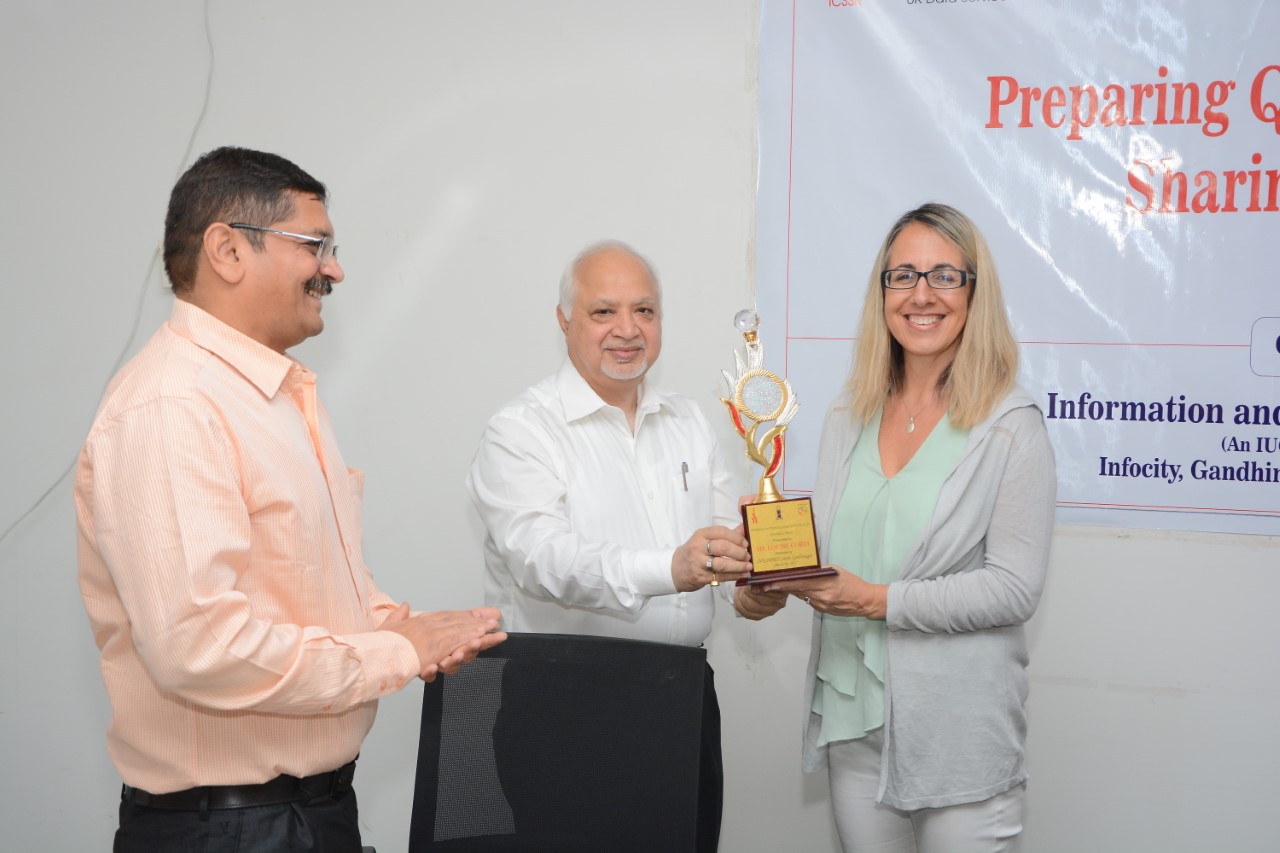Louise Corti, Director of Collections Development and Producer Relations at the UK Data Service, updates us on her recent trip to Gandhinagar, India, where she ran workshops on research data management and came up with a very cool dream about how chatbots can help prepare research data management plans for bidding to research councils in the future….
I was privileged to be invited to run a workshop as part of the 2017 CLSTL International Conference on Changing Landscapes of Science and Technology Libraries in Gandhinagar in the province of Gujarat, North West India in March. Gandhinagar is a relatively new city and a new Gujarat International Finance Tec-City is an under construction as a central business district between Ahmedabad and Gandhinagar, a project of the Prime Minister of India, Narendra Modi.
The event was organised by Dr. T.S. Kumbar of the Indian Institute of Technology (IIT) Gandhinagar, and brought together some 150 library professionals and researchers from Institutes of Science, Technology (S&T) and allied areas from across India and abroad. The aim of the event was to exchange ideas, new initiatives, experiences, research work, and best practices in S&T Libraries and to view how they are transforming themselves in the midst of rapid technology developments. Areas of focus included cancer research, space and nuclear fusion, geomagnetism, rural management, engineering and law. Dr Kumbar is the chief librarian at IIT Gandhinagar, with a long line of experience in various prominent technical libraries in India including IIT Mumbai, Chennai and Gulbarga.
IIT is well established in India as an academic and research hub of excellence and aims to construct a brand new library. Libraries are undergoing tremendous change and the theme of the conference was intentionally future focused. I found it encouraging that over the course of the conference all speakers made an effort to address the future; change has been so rapid in India that maybe it is something that is more readily and openly talked about.

Professor Sudhar Jain, Director of the IIT Ganghinagar in his keynote address, suggested that while is hard to keep up as landscapes keep changing, it is important to recognise where one wishes to be. In terms of designing libraries for the future, now is the time to do something for ‘Generation Y’, and to trust and empower them in this digital age.
The venue at the IIT was a modern and beautifully designed auditorium, and over the three days over 50 presentations in 9 single track sessions, making the event a rich listening experience. Speakers addressed topics such as physical space in new libraries, from architectural design to layout; to IT service provision, to optimising user experience through new technologies; to dealing with open access.
A whole afternoon was devoted to research data management (RDM), a topic which is prominent in many librarians’ ‘to do’ lists. There are no funder policies for data sharing in India and the area is really only emerging as an area that needs to be discussed. The organisers added in a dedicated practical workshop session. It was attended by all participants and well received, with many participants noting that this was the first time that RDM for institutions had been discussed in India. Librarians wanted to see where and how they fitted in this new data landscape, and what they would need to do to get there.
The workshop
Running an interactive workshop with 150 people is something I have not done before, but with some planning, I ran 4 sessions across the 4 hr period. Following an introduction data management planning, I set out the nuts and bolts of research data management and sharing, and participants were asked to work in pairs, to complete a paper-based a quiz and an exercise where they were asked to support the drafting of a data management plan (DMP) for a research scenario. My request for a show of hands for who had completed a DMP or helped a researchers complete on, yielded only 2 raised hands, both from North America. There are no funder requirements for DMPs or data sharing in Indian research yet. The only policy, the 2012 NPDSA policy is aimed at the public sector in making non-sensitive data (open data) available, and it was in response to that high level policy that the Indina Council of Social Science Research ICSSR Data Service was initiated. (See my blog post about the ICSSR).

After describing how the UKDS does its business, and how Institutional Repositories are faring in the UK, the new Indian Data Service (also located at Gandhinagar at INFLIBNET) showcased its new service and statistical data-browsing tool. The final session concluded with a readiness exercise for RDM in participants’ own libraries, an exercise we designed for our ICPSR summer school course.
As information practitioners and knowledge specialists, the sector is ready to engage with the challenges of the data deluge and how research skills are adapting to fully exploit this ever-growing amount of information. The sector is understandably hesitant, feeling that they need the skills to understand and handle research data in all its flavours, yet also excited to move forward to extend their skills in managing and curating collections. Some I met already worked in highly technical areas, like cancer research, space and nuclear research, and had very good domain knowledge.
At the end of the last RDM session I encouraged the audience to collaborate, inviting them not to go back to their organisations and work on introducing RDM ideas themselves, but to do some early thinking while the post-conference creativity juices were still flowing – then come together to exchange needs, challenges and ideas, and to create groups with strengths in key areas.
INFLIBNET, the Autonomous Inter-University Centre of the University Grants Commission (UGC) of India, as a key national information and library network, is likely to a good centre to facilitate connectivity and bring together library professionals to scale up activity, just like Jisc did with its RDM programme. Of course, dedicated funding for pilots would be very helpful, to help bring out early adopters.
After the workshop I had many participants keen to start engaging with data, ask me very specific questions. Fortunately there are many great resources to support institutions, such as from the DCC and Jisc in the UK. From our own point of view, I am now keen to work more closely with some of the biomedical data libraries who already have data they would like to document and share.
In the spirit of post-workshop support, I have offered an afternoon webinar where librarians from India can nominate a specific data collection that could be walked through our own data preparation pipeline, suggesting the most appropriate pathway to access for the chosen data.
Takeaways from the conference
On reflection I can say that I learnt many things about this period of rapid transformation in the library sector, from: redesigning physical space to meet the ubiquitous computing needs of ‘Generation Y’; meeting the open access agenda balanced again the needs for academic impact from; the increasingly availability of altmetrics; and the use of AI to help us answer students’ information needs. We are flooded with new technology; tools and ideas, spurring on a comment that in a couple of years-time, or sooner, Google will likely be able to do everything those publishers do now! Conferences are always inspiring, and this was no exception. Three presentations I especially enjoyed were:
- A presentation by Raghavendra Patil and Hemanthachar B entitled, ‘Game is on!! Gamification: a heuristic approach towards new age patrons for increased use of library services and resources’. Indeed, I was heartened by the fact that we have managed to engage with this idea with our own Data Quiz, was indeed a good outing into the world of new forms of user engagement for utilising quality open data;
- A presentation on ‘Cognitive systems redefining the library user interface’ by Ms. Kshama Parikh and colleagues. This addressed the use of AI in libraries such as chatbots. You’ll see how much it inspired me if you read to the end of this post!
- A presentation by Mr. William Odell of the global design and engineering firm HOK, entitled ‘Building a physical library in the light of a Google world’. William is an architect who has designed a wide range of award-winning projects across the world, with a focus on innovative research facilities. Designs that are a million light years from the library space I utilised when I was at University in the 1980s.
Time for Qualidata: extending survey archives’ skills
While I was Gandhinagar l also ran a half-day workshop for the new Indian Social Science Data Service (a survey archive) on how to ingest, curate and disseminate qualitative data as part of core archive business, following the same formula as the one I did for the Taiwan Survey Research Data Archive. I emphasised that it is only very small number of different steps that survey archives need to take to embrace publishing qualitative data. Staff from the ICSSR funding body in New Delhi also participated. Following the session I met with staff form the new archive to discuss their open source microdata browsing tools being developed, and the role the UK Data Service could play in testing and promoting them.
Concluding remarks
Feedback “The workshop on RDM run by Ms Louise Corti was a great experience to attend, and giving in-depth insights along with exercises was greatly appreciated by participants. I am sure that the issues covered in-particular relating to Data Management, Policies, Preservation Plan, along with case study of UK Data Archive, will be of immense help to librarians as well as researchers and institutions and will kick-start the culture of data sharing and reuse.” Dr Yatrik Patel, Head of Computer Communications, Distributed Computing and Operating Systems at Inflibnet
Finally, I would like to thank my hosts for their hospitality and generous gifts. I received flowers, sweets, mugs and a wonderful trophy, which is my Data Oscar.

Post script: Ask Redama
I finish with asking you,dear reader, to consider this scenario that I dreamt up at one lunch time following the inspiring talk on AI in libraries, and over a rather wonderful vegetarian thali, polished off with sweet fragrant Masala tea.
“Meet Redama, she is our new chatbot for the research data management team. You can ask Redama anything, and she will be available 24/7 to provide an instant response as best she can. And, most conveniently, the night before your research application is due in to the ESRC! Go on, ask her about consent forms, data formats, and encrypting data – her breadth of expertise is excellent.
Using neural network and other AI techniques, she has been built on top of multiple rich sources of guidance:
- our large knowledge base, gathered across the years from the receipt of, and resolution of, queries from users – researchers, students, data professionals and so on
- a huge suite of pages on RDM
- a detailed FAQ on RDM.
One final thing: try not to be sarcastic, as AI does not deal will with sarcasm and yours response may be nonsense!”
Dream ends, but I am planning to pursue a small project to explore this area, through a local professor and masters student and I’ll report back when we are further down the road of exploration. The librarians in India have inspired me, and I hope I inspired them.

